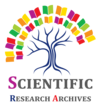Utilization of traditional medicine in the treatment of ailments among aged people in Ughelli community of Delta State
Traditional, complementary and alternative medicine (TCAM) refers to a set of healthcare practices (indigenous or imported) that are delivered outside of the mainstream (orthodox) healthcare system. The broad objective of this study was to investigate the use of traditional medicine in the treatment of ailments among aged people in Ughelli Community of Delta State, Nigeria. The study comprised of 241 subjects (121 males and 120 females) of about 40+ years who were resident in Ughelli community. First, a self-administered, open and close questionnaire was carefully structured, validated and issued to a cross section of selected subjects from within the study area. The instrument obtained the socio-demographic records of the subjects, alongside their knowledge on traditional medicine, attitudes towards, as well as practices towards traditional medicine. Information on the source, benefit, adverse effects and frequently used traditional medicines were also collected from participants, while leaving them with multiple responses in the open-ended questions. Following data collection, Results were subjected through the Statistical Package for Social Sciences (SPSS version 25), using the Chi-square test at a 95% confidence interval. One-way analysis of variance (ANOVA) was also used to compare the differences in means between groups, while setting a p value less than 0.05 as statistically significant. From our observation, an average of 98 subjects strongly agreed to their knowledge of the effectiveness of traditional medicines in the treatments of ailments. This number was of significant increase in comparison with about 76 subjects who were not sure in their response on the effectiveness of traditional medicines over orthodox in the study area. In addition, this negates the total number of sampled respondents (15%) who posited to disagree in support of the non-effectiveness of traditional medicines over its effectiveness. Also, a great percentage (36%) responses agreed that drinking is a far effecting and popular route of administering traditional medicines than others, while about 27% strongly agreed to this; even though a greater proportion of responses were not sure of the topical routes of applying traditional medicines.
